#Nuanced Concept Translation
Explore tagged Tumblr posts
Text
What is Concept Elaboration? Concept Elaboration Services
Concept Elaboration and Understanding the Importance of Clear Communication The intricacies of language often present challenges, especially when conveying complex ideas across different cultures. Concept Elaboration, a vital process in language services, ensures clear and comprehensive communication. This article delves into the origins, implementation, and significance of Concept Elaboration,…

View On WordPress
#Accurate translation services#Clear and Precise Translations#Comprehensive Localization#Cross-Cultural Communication#Culturally Relevant Adaptations#Detailed Concept Explanation#Effective Global Messaging#Expert Concept Elaboration#Expert Linguistic Analysis#High-Quality Interpretation#Multilingual Communication Services#Nuanced Concept Translation#Professional Language Solutions#Seamless International Communication.#Specialized Industry Expertise#Tailored Language Solutions
0 notes
Text
WARDI TERMS OF ENDEARMENT
emense [ɛmɛnse] (eh-mehn-say)
Has meaning close to 'beloved' or 'darling'. "Ya emense" (meaning 'my beloved'/'my darling') is often contracted "y'mense".
bubuch [bubuk] (boo-bookh)
Somewhat of a nonsense word, basically ‘big-big’. Tends to either be used for small children or flirtatiously between adults (kind in between 'baby' and 'big boy' in functionality, though without gendered implications of the latter). Sometimes instead used as a form of intense condescension.
ya mache mes [ja mɑke mes] (yah mah-kay mace)
Functionally means "my other face", using the figurative word for face describing a concept of fundamental nature rather than anatomy. Very intense term of endearment, expresses the recipient as a core part of one's identity. Kind of equivalent to 'my other half' but not exclusively romantic.
ya tsitsima [ja ͡tsi͡tsimə] (yah tsee-tsee-muh)
Means "my blood". This term is used more broadly to denote familial relations, and is more of a term of endearment when used outside of actual biological relationship (calling your sister 'my blood' is just an intense way of saying 'my [relative]', calling a non-relative 'my blood' is VERY pointedly affectionate).
ya ungande [ja ungɑnde] (yah oon-gahn-day)
Often contracted to y'ungande, dead literally means "my liver" as in the organ. Ungande alone is also used as a food-based term of endearment, similar to 'honey' except instead with delicious organ meat.
anuje [ɑnudʒe] (ah-noo-jay)
Food based term of endearment, referring to a tree sap that is the most commonly used form of sweetener. Functionally identical to 'honey' in usage.
anu tlansekoma [ɑnu tlɑnsekoʊmə] (ah-noo tlahn-say-koh-muh)
This one actually means 'honey' (dead literally 'bee sweet'). Less common than 'anuje' as a term of endearment due to general cultural preference for anuje as a sweetener and the relative rarity of beekeeping.
inyagit [injəgit] (een-yah-geet)
Diminutive form of 'sun'. 'Ya inya' (my sun) occurs as well, but is less common.
y'mit agai [j'mit ɑgaɪ] (yuh-meet ah-gai)
Contraction of 'ya amit agai', 'my blue moon'. This specification is more common than a general 'my moon(s)' and is fairly loaded, given this particular moon is the site of the afterlife for the most honored dead. The phrase both suggests a sort of celestial beauty and a sense of being honored and finding rest in the recipient. This is a VERY intense and almost exclusively romantic term of endearment.
coutomara [koʊtoʊmɑrə] (koh-to-mahr-uh)
Means 'handsome' or 'beautiful', implies masculine attractiveness. (Dead literally closer to 'strong face'/'strong featured').
jaimara [dʒaɪmɑrə] (jaim-mahr-uh)
Means 'pretty' or 'beautiful', implies feminine attractiveness (dead literally close to 'beautiful face'/'beautifully featured').
katsuy [kɑtsui] [kaht-soo'ee]
Sexually charged description of physical attractiveness, basically calling someone 'sexy'.
ya katsuymen [ja kɑtsuimɛn] (yah koht-soo'ee-mehn)
Related and also sexually charged, close in meaning to 'my desire'.
at akmatse yachouy [ɑt ɑkmɑtse jɑtʃɔɪ] (aht ahk-mat-say yah-choi )
Sexually explicit term of endearment. The dead literal translation is "one who makes me flower". The word "flower" here is not as euphemistic in context and is rather the nicest sounding possible way to say "makes me cum (HARD)". Not considered vulgar, rather cloyingly romantic if anything.
gan(ne) ama [gɑn(e) ɑmə] (gah(-nay) ahm-uh)
Means 'bull'. When used affectionately, implies masculine strength. Usually used in conjunction with an adjective (ie 'handsome bull') or more teasingly gannit ama (little/baby bull))
jaimeti [dʒaɪmɛti] (jai-meh-tee)
Means 'gazelle' (the name for the animal itself is close in meaning to 'beautiful horn'), heavily associated with grace and beauty. Also tends to be used with adjectives ('lovely gazelle' 'handsome gazelle' etc) or with a diminutive.
ansiba [ɑnsibɑ] (ahn-see-bah) or ansibit [ɑnsibit] (ahn-see-beet)
Means 'duck' and 'duckling' respectively, specifically refers to the animal and implies cuteness. Ansibit is a very common term of endearment for children.
"Wannaukoma such datse anmo" [wɑnaʊkoʊmə suk dɑtse ɑnmoʊ] (wahn-now-koh-muh sookh daht-say ahn-moh)
Means 'an ant could swallow you', implies cuteness (ie the recipient is so small and tiny an Ant could devour them whole). Usually used on children, occasionally used on adult women (in a way that feels intensely patronizing to many). 'Datse' (you) may be replaced by the recipients surname or honorific in the rare case that someone would dare calling someone this without being on first name basis with them.
wannaukomit [wɑnaʊkoʊmit] (wahn-now-koh-meet)
Means 'little ant', a term of endearment that borders on insulting even to babies.
OTHER:
-it [it] (eet)
This is a diminutive modifier, which can be added to a name or other word/term of endearment to denote affection (can also be condescending). It lacks internal meaning in everyday use and is closer to the English -y or -ie (billy johnny rosie susie puppy kitty ducky etc).
hippe [hipɛ] (heep-peh) (some dialects drop the h sound entirely)
Means 'small' or 'little', can be spoken with other words/names as an affectionate diminutive.
Other epithets-
Various epithets used in the language are not exclusively used as terms of endearment, but can be contextually. Most commonly, this will be the -machen epithet of the recipients zodiac birthsign (particularly those considered auspicious). Someone with the lion birthsign could be respectfully and/or affectionately called 'odomachen', or VERY affectionately called 'ya odo' ('my lion'). There's also a good variety of poetic epithets that have worked their way into common language as affectionate compliments/descriptors- ie ganatoche (dead literally 'cow-eye', more prettily 'ox-eyed') is a complimentary descriptor for brown eyes, anaemaitsa (dead literally 'river-haired', more prettily 'flowing-haired') compliments wavy hair.
Given name basis-
In Wardi culture, full names are spoken with the family name preceding the given name. When respectfully speaking to a stranger, peer, or authority figure, you refer to them by their family name, title, and/or an honorific. Being on an accepted given name basis with someone is generally indicative of closeness and affection.
datse [dɑtse] (dah-tsay)
This is the word for "you". Similarly to the use of a given name, actually referring to someone as 'you' (rather than a surname, title, or honorific in place of the pronoun) expresses familiarity and intimacy.
#FUCK I LEFT A HUGE ERROR IN THERE OVERNIGHT . Okay#Even longer Wardi insult/vulgarity post coming someday#I can't actually put a lot of the linguistic Nuance in the writing because it doesn't 'translate' well in english. Especially the avoidance#of 'you' pronouns between unfamiliar company. Translating it ranges from mildly clunky to borderline unreadable#(Ie if you're asking a stranger's name in Wardi you'd use an honorific that is roughly equivalent to sir/ma'am if you're being#deferential or 'mister/miss' if not. 'What is mister's name?' sounds weird as fuck in english)#I could just include the in-universe honorifics instead which would avoid that but I'm really trying to avoid loading the text with#constructed language where it's not really necessary. I mean I'm not writing this to be a mega-approachable mass appeal story but#having to memorize a bunch of constructed terms can be a pain in the ass as a reader#(like there's still a lot in there but it's mostly 'untranslatable' words or very specific concepts)#And ultimately just saying 'you' and dropping the nuance of how 'you' is insulting when not used in close company is more efficient#I do have the last name/first name basis distinction in there textually though. A lot of the characters refer to each other#exclusively by surname
100 notes
·
View notes
Text

2024 reads / storygraph
Outdrawn
f/f contemporary romance
two cartoonist who’ve been rivals since uni, and now have competing webcomics online, have to work together on the relaunch of a cult classic at the comic press they both work at
they both struggle with art-related physical and mental health issues, and complicated families
#outdrawn#aroaessidhe 2024 reads#sapphic books#I thought this was decent! I liked the concept (even if I got distracted by some art related things…)#and the dynamic between the characters was good. I enjoyed their relationship development broadly speaking#and the emphasis on communication; though it was a quick flip into being together all of a sudden.#The sketchbook doodle flirting was cute. Some interesting exploration of their complicated family situations too.#There’s a lot of exploration of burnout and carpal tunnel and the dangers of artists overworking which I think are important conversations#and are done with some nuance. But it’s pretty much all discussed in the context of the personal pressure they put on themselves#rather than the industry corporate greed and artificial competition created by the comic platform - which are significant in this story!#It felt odd that that connection wasn’t really ever made?#I know that this is a romance and nitpicking the background plot is beside the point and also that I am not a big romance reader#but the premise that the comic hosting site archives everything; wipes the leaderboard; and out of nowhere has a comic competition for#new weekly chapters…I’m sorry but the art world would riot. Even if people enter because they’re desperate for the cash they’d be pissed#People live off the income from their webcomics! if they were erased (temporarily) with no notice…..there would be crimes committed istg#I simply don’t believe that it would be doable to create a new weekly webcomic with no notice while you also have a full-time comic job#(especially as the only stylistic choices mentioned are full-colour) - not to mention what happened to their 8-years-running webcomics#that were archived? they don’t think about them at all after the beginning? surely they’d care about that?#And then with their new comics they make for this competition (after work I guess) we get vague snippets about them but barely anything#- if they’re consuming that much of your time I would expect to feel like they’re thinking about them all the time#rather than the vaguest discussion about genre and cast numbers only.#I guess I just think the whole comic site stunt felt unnecessary for the plot anyway -#it would have worked exactly the same if they were just competing on the normal leaderboard with their normal comics???#anyway - I’m not judging TOO hard about all that because again I know it’s not the point and maybe the industry is like that in some place#Unfortunately it was distracting enough to affect my feelings on the book tho lol.#Lastly: the audiobook………oof. The narrators talk at different speeds; for one.#And Sage’s VA does this deeply weird raspy-anime-teen-boy voice for Noah which is such an odd choice#and doesn’t match her character at all.#unforch my library only had the audiobook (what I usually prefer) so I just had to sort of….translate the narration into a normal voice lol#anyway the romance is good tho
41 notes
·
View notes
Text

no one can reach my level of petty hating about the stupid english title
#ada speaks#after scott made that thread about how the legitimately valid complaints about infinite wealth's loc didn't matter because of sales#i was like. god damn dude. like what a. horrible reality. so i'm voting with my money. i guess.#not that theres ANY FUCKING WAY to make these things known when there's nuance to it that Sales Numbers obviously can't convey#im just another +1 to the jp sales number and i'm fairly sure they count everything as Worldwide due to eng being included in all regions#but !! at least i dont have fucking. pirate yakuza or whatever the hell that english title is sitting on my shelf#and the other really fun thing is that availability of the game in canada is total ass and exclusive to some random online retailer#i cant preorder from....... fucking gamestop?? ok i guess it's amazon jp time. since this is. somehow easier.#anyway. hey sega. can we fucking talk about your english loc team and crunch and simulreleases.#can we maybe like. release a Good product and not a product that Sells.#these games are going to sell regardless because. the GAMES are good#people are going to buy them for The Core Game. and they are going to Put Up With the shitty localization.#im just. man. remember when SoA used to be proud of what they put out there. what a crazy concept.#if you're pointing to sales numbers to Own The Haters idk what to tell you. i think the haters might have a point. just this time.#you can't genuinely defend how undercooked and sloppy it is by explaining specific choices made or being informative#like so many times in the past#so its just.#lol suck it the games still sell#like yeah no shit. obviously??????????? but why in gods name should we have to Settle for a lesser experience#just because corporate wants a Finished product and not a Good one#frustrating <3#god forbid art be anything but a consumable slop product with a Serviceable translation#to me this is one step removed from shipping it without any translation and being like lol just use google translate bro#and when everyone is like ????? what the fuck???? its like well it still sells. so clearly this is what the people want.#boooooooooo
22 notes
·
View notes
Text
It never occurred to me that people might have taken her line to mean "it won't be terrible for you because I'll be there with you making it less bad for you"; I always interpreted it to be more "it won't be terrible for me because you'll be there making it less bad for me." Because, as you point out, Solas's line that she's reponding to here is warning her that it will be bad.
And maybe what you also say about Elvhen being a language of context and intent rather than meaning mapped to phonemes means I shouldn't even continue this particular train of thought, but the words they say in Elvhen are:
Solas: Ar ghilas vir banal. Inquisitor: Tel'banal ar ama.
youtube
[ as transcribed by whoever added these lines to the DA wiki ]
Or, strictly literally, if my Elvhen is up to par:
Solas: I go will be bad. Inquisitor: Not bad I you.
Yeah, the literal translation isn't as elegant as the one they put in the subtitles, and maybe that's where the whole Elvhen-is-a-language-of-vibes-rather-than-literal-translations part is supposed to come in (because lbr they didn't actually create a whole language just a lot of vocab words). But I think that understanding what they're saying in Elvhen and not just the subtitle translation adds a deeper layer of meaning to the delivery, if nothing else.
Now, I admittedly did not pass an Elvhen class for my ancient languages elective in school, so forgive me if my translation is wrong, or if the wiki-adder's transcription is wrong and I can't recognize it because my fluency in Elvhen is shaky at best (/hj). I don't think "ama" is a word we see used anywhere else, but we know "ma" is either "my" or "you" (as per "Ar lath ma, vhenan" = "I love you, [my] heart") and "ar" is already a first person pronoun so "ama" is likely the "you" part.
I extrapolate from this that "ama" is either some conjugated form of "ma" and "ar ama" is literally translated to just "I you" and they skip the conjunction ("and" / "with") in this phrase in Elvhen— or that the extra a- there on "ama" is something that is added to the second word to give the meaning of "and" or "with" without using an additional word for it like we do in English. (Similar to how English modifies nouns into possessives using 's at the end instead of the separate preposition "of," or Latin uses the genitive form to denote posessives instead of even having a preposition for it, or iirc Japanese uses the preposition "to" with the second word or phrase in place of a conjunction at all.)
Or, the person who transcribed the Elvhen words made a mistake and it should be "Tel'banal ar a ma" and "a" is their conjunction and my whole point here should be discarded. (Because I don't think the game ever transcribes the Elvhen words for it, right? The person who wrote it in the wiki probably transcribed it by ear and chose where the words are broken themselves?)
But!! What I'm getting at with all of this excessive linguistic nerdery is that if Elvhen doesn't use a conjunction to say "you and I" or "you're with me" or "I'm with you," but rather has one streamlined phrase "ar ama" (or even "arama"/"ar'a'ma" maybe) then they way they conceive of the concept of "you and me" is different from how we conceive of it when we say things like "you're with me" using three whole separate words in English. (Like when Harding tries to translate that bit of Dwarven in VG but she struggles to translate its precise meaning into the common tongue because in Dwarven they have a pronoun that means "I" but also "we" but in a collective sense rather than as multiple individuals, and that concept doesn't exist as a pronoun in English/Common.) And we wedge the third word between the "you" and the "me" in that phrase in English, while the meaning spoken in Elvhen might have been closer to "us." But "It won't be terrible if us" isn't grammatically correct in English, so they went for a translation that was grammatically correct over one that doesn't follow English grammar but is closer to the Elvhen meaning, because most fans will just be reading the subtitles and not out here learning Elvhen in their spare time.
Then again, I guess they could have chosen to translate it as "if we're together" but they didn't and I could be placing way too much stock in attempting to grasp the nuances of a fictional language that they probably just didn't bother to come up with conjunctions in.
But!!
Ar ama. :) I just think it's neat.
Inflection, Context, and Elven: Lavellan’s Veilguard Ending (romance state)
Lately, I’ve seen quite a bit of criticism directed at a romanced Lavellan on my dash - particularly in the Veilguard ending, interpreting her as needy, egotistical, or entitled.
And I am wondering: Did we watch the same ending? (I find it fascinating how differently people interpret the same moments - such a reflection of the human experience.) And I couldn't help myself! I felt compelled to share my interpretations so I punched this out the last few days.
The sticking point seems to be Lavellan’s words, especially the ones spoken in Elven.

It seems like a common interpretation of Lavellan’s words here are:
“It won’t be terrible if you’re with me.” (Implying possessiveness or entitlement - and that she alone will make it better.)
The game’s delivery offers no inflection on any word though. For me, it’s always been:
“It won’t be terrible if you’re with me.”
It’s subtle, but very different. This is just one micro-example of how much nuance is packed into the dialogue in the Veilguard ending. These lines shouldn’t be taken in isolation - especially not the Elven ones. They should be understood in the context of what Solas says to Lavellan in Elven just before, and beyond that, within the history established in Inquisition and Trespasser.
Indulgent Solas x Lavellan post ahead.
Still here? Excellent. (And sorry, it's another long post.)
"Elven is often a game of intents, not direct mapping of phonetic meaning." The language doesn’t rely on straightforward translations of sounds or words into specific meanings. Instead, it operates on a deeper level, where intent and context carry as much weight.
Earlier in the game, when Solas confronts Elgar’nan, he says: “I must speak to you in this tongue. It seems Elven is beyond your grasp.” This insult implies that Elgar’nan has lost the ability to understand the nuanced, metaphorical nature of the language. Elven relies on shared understanding, rhythm, intent, to convey its full meaning. By Lavellan and Solas choosing to speak Elven to each other it's an acknowledgement of their shared understanding - a connection rooted in their history going back to Inquisition.
Which is why I embrace it in my interpretations.

This is personal and expansive. On one level, she’s speaking as someone Solas has wronged, reminding him of the pain he’s caused her directly. But on another, she’s channeling the voices of countless others whose lives were affected by him and who will be shattered by his actions. It’s a challenge that blends her role as both an individual and the Inquisitor.
It’s also not a condemnation. Lavellan doesn’t lash out or accuse him of being irredeemable. Instead, she questions him, cutting through to reach the man beneath. She’s speaking to Solas (wisdom).

"Vhenan" is acknowledging his love for her but it’s also symbolic of his heart, the part of himself he’s buried and tried to ignore, suddenly reappearing. Solas has spent much of his journey detached and isolated, removing his heart metaphorically to push forward with his plans without the weight of emotional ties. Lavellan’s presence makes it impossible for him to keep it hidden. His heart is right there, exposed and speaking. And the ellipsis - so many words unsaid.
Immediately Solas looks down (I read it as shame). It’s a reaction back to what he said in Trespasser: that he would not have her see what he becomes. And yet, here she is. She sees him, the terrible path he has chosen, the blood on his hands, the awful things he has done, and what he’s about to do. In that moment, his shame is palpable - because Lavellan is one person he couldn’t bear to face in this state.
And Lavellan doesn’t hesitate. Her next words are as much about holding him accountable as they are about reminding him that there is still another path.

This isn’t some starry-eyed, naïve Inquisitor we’re dealing with (at least mine isn’t). Lavellan is fully aware at this point. But her stance is clear: no one is beyond redemption, not even the Dread Wolf himself. And she wasn’t the only one – this message is repeated throughout the game by others.
Her words challenge the belief that has kept Solas shackled to his path. He’s convinced himself that his guilt and mistakes are too great, that there’s no turning back.
She doesn’t beg or demand or frame it in a way that’s grand and sweeping – she simply says “you’re wrong.”
She’s not trying to erase his mistakes or pretend they don’t exist. She's saying, Yes, you’ve done terrible things, but that doesn’t mean you’re beyond the reach of change.

Lavellan’s journey as Inquisitor began with the Anchor - a mark born of Solas’s mistakes and choices. From the moment she touched his orb (yes, it sounds dirty), her path became entwined with his. This isn’t Lavellan selfishly claiming Solas’s path; it’s an acknowledgment that their journeys have run parallel.
Lavellan’s work to stabilize Southern Thedas mirrors Solas’s aim to restore a broken world, including the burdens of being forced to take on titles and labels. She is revealing her own struggles with devastating, blood-soaked choices - choices that, like his, have carried profound consequences.
Solas believes he’s been walking this path alone, but Lavellan shows him she's been walking alongside him this whole time. Now, as their paths converge again, this is a reminder of the power of connection and the burdens they’ve both borne. He's actually not alone.
Her words also carry an unspoken promise: she is ready to continue to bear the consequences with him. She knows the road ahead is painful and fraught with difficulty, but she is steadfast.
Why do I feel that people sometimes forget Lavellan’s role as Inquisitor? She wasn’t defined by Solas; she was the leader of a powerful military and political organization, forced to make horrible decisions. Whether you choose the mages or templars in Inquisition, you doom thousands to torment and death. The Empress of Orlais can live or die based on the Inquisitor’s choices. And if you’re like me and made the wrong calls on the Dalish clan war table operation, her own clan can be murdered and wiped out. (Yes, I’m still haunted by that moment.) Her hands have blood on them too. This makes me wonder: does some criticism of the Solas/Lavellan romance stem from failing to see Lavellan as her own person? I love Lavellan for who she is as the Inquisitor - not because of Solas. Likewise, Solas is fascinating on his own. Their romance is one layer of the story, not the foundation of either character. Sometimes it feels like there are even some Solas/Lavellan lovers who have a tendency to overlook the depth and individuality of both characters outside of their romance.

Solas’s statement is a raw admission of all the guilt he carries for his deceptions and the pain he has caused her - lying to her about his identity, betraying her trust - not just as the Inquisitor, but as a person he loves.
His words are not an attempt to seek forgiveness but an acknowledgment of the truth - no matter how painful it is for them both. He knows his choices have caused devastation to the world and to her specifically. He's exposing the full weight of his dual burden: the grand, world-altering consequences of his plans and the personal betrayal of the woman he loves, who trusted him.
Perhaps, on some level, he hopes that reminding Lavellan of his lies and treachery will convince her to abandon him, sparing her further pain. His guilt and self-loathing are so entrenched that the idea of being forgiven - or even supported – either confounds him or terrifies him.
But Solas’s confession is not just a shield to push her away. It’s also an invitation for her to see him - not the wise, compassionate companion she knew, but the flawed, broken man beneath.
This moment to me shows that Solas still values Lavellan’s understanding (we also saw it in his letter to her). He doesn’t diminish the weight of his actions but wants her to see the cost of his deception - not just for her, but for himself. To Solas, his betrayal is unforgivable.
And yet - this "selfish" woman dares to forgive him anyway.

Forgiveness is an act of wisdom because it requires understanding - and she reflects that wisdom right back at him.
"All you have to do is stop" is heavy with meaning. Yes, on the surface, it’s a plea to stop tearing down the Veil, to reconsider the destruction. But it’s also a plea for him to stop running, to stop isolating himself, and to stop punishing himself for his failures. She’s asking him to step out of the shadow of his self-loathing and see that there’s another way forward, not by demanding or commanding, but by offering him compassion (forgiveness). (Cole, I miss you.)
But Solas’s guilt and self-loathing run deep.


With these words, Solas apologizes to his heart - hardening it once more. For a moment, it had softened, cracked open. But he shuts the door.
The bow that accompanies his words is loaded. A bow carries layers of meaning depending on context - reverence, respect, gratitude, apology, greeting or farewell, a spiritual act, acknowledgment, loyalty, mourning, or even a romantic gesture. Solas’s bow can mean all of these.
He is physically reinforcing the gravity of his apology. It’s a solemn moment. He is bowing to her strength, to all she has endured because of him. And when he calls her "vhenan," it is personal. It's an apology to her and to his own heart for not choosing the life he wanted to have with her. “...to stay by your side as Solas...as I wanted.”
The bow also carries guilt. He is acknowledging the pain he’s caused and humbling himself before her. And his eyes in the animation during this moment – I saw haunted, tormented, tired eyes – the eyes of a man grappling with the weight of his choices and the thought that he cannot accept redemption, even if it’s offered freely.

But, as I’ve said before, it takes a village to stop a Solas. Cue Morrigan and Mythal - but I’m not diving into that dialogue rabbit hole in this post.
But this scene with Mythal is important. Lavellan has just watched the man she loves completely crumble in front of Mythal. He’s bent over in grief/pain, utterly vulnerable. She hears him say, in anguish, “The things that I have done.” She sees him lift the dagger - perhaps to surrender it, to shield himself from Mythal, or even as a plea to Mythal to end his torment. Whatever the intent, Lavellan is witnessing the rawest, most broken Solas. His guilt is overwhelming, and this is the first time she’s truly seeing the full weight of it laid bare (as is Rook). It’s a moment of heavy sadness for her – and for us as players.
Solas is bent over with the emotional collapse of centuries of obligation and guilt coming to the surface. Mythal’s departure leaves Solas vulnerable, stripped of the purpose that has guided him for so long. He is alone in his pain.
For Lavellan, can you imagine the helplessness? All she can do is offer her presence, understanding, and faith in him afterward. That might feel like so little in the face of such immense pain, but it’s all she has to give.

Where Mythal’s words, spoken in the common tongue, are authoritative and final, Lavellan’s are intimate and personal. Her choice to speak Elven reflects her desire to meet Solas where he is - connecting with him on an intimate level.
Only after Mythal has left him exposed - that Lavellan uses the Elven language. In this moment, stripped of his defenses, he is finally open to hearing and feeling the full significance of the words and their intent.
Lavellan’s words challenge the notion that fate is immutable or inevitable. When she says, “there is no fate...,” she isn’t diminishing everything else in favor of her love; she’s rejecting the tyranny of inevitability. Her words assert that choices - rooted in love, connection, and shared purpose - have the power to shape their path forward. She reframes love as a force just as powerful as fate, capable of creating meaning and direction where there once seemed to be none.
Atonement
And at this point? Lavellan has no idea what Solas will do next. None of them do. But the combined efforts of Rook, Lavellan and Morrigan get through to him. Because Solas makes a choice - a monumental choice. He binds himself to the veil, committing to atonement. Atonement is a powerful, active word. It evokes the gravity of recognizing wrongdoing and the courage to address it. His decision to seek restoration with the Titans, to deal with the Blight, to return to where it all began, reflects the depth of his remorse and his willingness to rebuild the balance he disrupted – from the beginning.

Solas equates atonement with isolation, believing that his punishment must be borne alone. To him, atonement requires severing ties, including the possibility of love. He doesn’t ask Lavellan to join him because he cannot conceive of burdening her with the weight of his choices and the path he must walk.
But Lavellan’s words - once again - challenge that. She offers him the possibility that his actions, no matter how devastating, do not erase the love and faith others still have in him. This is an invitation.
She's also being vulnerable here. She’s offering herself to him, knowing full well that he still might say no. A risk she’s willing to take.
He doesn’t try to shut her out or push her away this time. Instead, he shifts the focus - he needs her to understand the gravity of the path they are about to walk. His response reflects his own vulnerability as well, he wants her to know what she’s choosing, but he can’t bring himself to reject her offer outright.

Solas responds in Elven - his acknowledgment of their shared understanding and their entire relationship and journey that has shaped them.
His words also mark a turning point: for the first time, Solas allows Lavellan her agency. Throughout their relationship, he has taken her choices away. He broke off their relationship in Inquisition. He vanished after Corypheus’s defeat, leaving her no say in it all.
Lavellan is asserting her choice. And this time, Solas doesn’t take it from her.
By framing his destination in such stark, "terrible" terms, Solas isn’t pushing her away out of cruelty. He’s laying bare the enormity of what lies ahead, warning her of the peril while giving her the freedom to choose for herself. It’s his way of ensuring she understands the stakes.
Solas is doing what she requested long ago - trusting her - and what a choice to place that trust in. He’s entrusting her to make an informed decision about stepping onto a path that could shape the future of Thedas. He is trusting Lavellan’s strength and resiliency. And in trusting her, Solas reveals a quiet, unspoken truth: he doesn’t want to face this journey alone. By even presenting the choice, he reveals a quiet hope that she might go with him, despite everything.
To me, what makes this moment so achingly beautiful is the duality in his expression. His eyes seem to plead two things at once: “I don’t want to put you in harm’s way,” and “I can’t deny wanting to be with you.” There’s a raw vulnerability in the way he looks at her.

“It won’t be terrible if you’re with me.”
Lavellan’s response is a direct challenge to Solas’s warning. He tells her the path ahead will be awful - because of him. But she counters, saying that it’s because of him that it won’t be. This isn’t her forcing herself into his journey or suggesting that she alone will make it better. Instead, it’s her way of expressing that his presence will give her the strength to face whatever lies ahead - he's fucking worried about her! She’s trying to ease his mind, while also signaling her willingness to trust him again.
At the same time, her words acknowledge the weight of Solas’s suffering, offering herself as a partner to bear that burden together. She isn’t dismissing the risks or downplaying the severity of what’s to come - she’s choosing to stand beside him, fully aware of the challenges ahead.
It’s not about personal gain; it’s about shared resilience. Lavellan’s focus is on what they can endure together, not on what she might receive from the journey.
And since the Fade reflects emotions, as many have pointed out, their combined trust and love could manifest in ways neither of them can predict. Their bond has the power to shape not just their path but the very world around them.

This declaration is past, present and future; it’s a reaffirmation of their bond, a recognition that they’ve been walking the path of the dinan’shiral together all along. It’s future focused - she is offering to shoulder the burden with him going forward.
She’s also telling him that she won't abandon him, no matter how hard the road ahead may be.
And at the end of the day, she's a woman who still loves him. What does Prince Lir say in The Last Unicorn? "I love whom I love."
I've never interpreted Lavellan as someone sitting by a window for ten years, writing sad poetry and sighing into the wind, longing for Solas. She’s been busy - rebuilding a fractured world, navigating political fallout, and seeking understanding. Lavellan’s love for Solas isn’t blind devotion; she’s holding onto the possibility of redemption and the deep impact he had on her life. In my world state, Lavellan’s clan is wiped out. The people of the Inquisition have become her family, the ones she fights for and protects. And indirectly, Solas gave her that family. Despite the pain he’s caused, her love for him reflects the complexity of her journey - one defined not by a single relationship, but by hope, resilience, and the connections she’s forged along the way.
Lavellan then leans in to kiss him, and Solas allows himself to be drawn in. This moment is acceptance - a silent vow, a promise sealed in their shared vulnerability. It’s an intimate connection forged in front of those who have just witnessed the emotional storm that brought them to this point, as if to say, “This is where we stand, together.”
And then Solas turns to Rook and says, “Thank you.”
Solas doesn’t thank Rook when he hands them the dagger, nor when he’s preparing to walk into the Fade. He says it after the kiss.
In thanking Rook, Solas acknowledges not only their actions but also their understanding of the connection he shares with Lavellan. Rook, transformed by their own relationships and the bonds they’ve formed throughout their journey, embodies the themes that have always defined Dragon Age to me: connection, fellowship, community, love, and redemption. These games (again, for me) have always been about how people, despite their flaws and struggles, can come together to make the impossible possible.
Rook’s symbolism in the redemption ending feels like the culmination of this ethos. They represent how even those who begin on the periphery of great events can become central to forging bonds and creating change. Solas’s gratitude is for Rook's empathy, their recognition of the importance of connection, and their role in bringing these threads of love and redemption together. I'll go cry now.
And off they go into the Fade.
The Final Translation
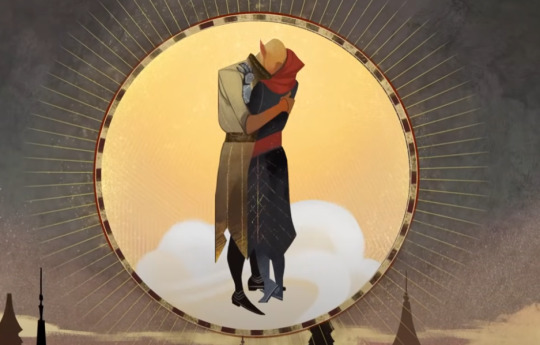
"With Elgar'nan and Ghilan'nain dead, and the Inquisitor finally reunited with her true love, it looked like one of the biggest stories the world had ever seen was finally drawing to a close."
Varric’s narration ties the ending image back to the connection between Inquisition and Veilguard. Inquisition is the Inquisitor’s story; Veilguard is Rook’s. Solas serves as the thread linking them. Varric frames this moment through Lavellan’s perspective, narrating the story like one of his novels - not to diminish Solas, but to highlight the Inquisitor’s journey. After all, Veilguard wouldn’t exist without Inquisition. Rook wouldn’t be working with Varric or searching for Solas if not for the Inquisitor.
As much as I would have loved a deeper focus on Solas, Veilguard wasn’t his story. If Inquisition is the Inquisitor’s story and Veilguard is Rook’s, this ending is a shared culmination: for a romanced Lavellan, it’s the personal resolution of her journey; for Rook, it’s recognition of their critical role in saving Thedas.
Okay, indulgence over - whew, that was long! I really need to practice shorter posts.
In the end, those who dislike this romance or this ending probably always will. That’s fine; I just wanted to share my interpretations because I genuinely love this story for all its complexity.
To everyone who made it to the end of this post - thank you for joining me in my indulgence. May your own Solas ships continue to bring you joy and inspiration.
#dragon age#solavellan#fanwank tbh#maybe don't perceive me idk#but also I think that even if the language of Elvhen is fictional and might not have literal translations it should still be considered tha#in universe they ARE speaking in a different language#and different languages can have different nuances#eg whether or not they created an entire Dwarven language they still wrote into the DA canon that Dwarven has a pronoun that can't be neatl#translated into not-Dwarven#so like that concept of the potential inaccuracy of translations exists in universe even if no 'correct translation' exists out of universe
108 notes
·
View notes
Text
Did you know that the english word “star” and the japanese word 星(ほし)don’t actually mean the same thing?
Language does not simply name pre-existing categories; categories do not exist in 'the world'
— Daniel Chandler, Semiotics for Beginners
I read this quote a few years ago, but I don’t think I truly understood it until one day, when I was looking at the wikipedia article for “star” and I thought to check the Japanese article, see if I could get some Japanese reading practice in. I was surprised to find that the article was not titled 「星」, but 「恒星」, a word I’d never seen before. I’d always learnt that 星 was the direct translation for “star” (I knew the japanese also contained meanings the english didn’t, like “dot” or “bullseye”, but I thought these were just auxiliary definitions in addition to the direct translation of “star” as in "a celestial body made of hydrogen and helium plasma").
To try and clear things up for myself, I searched japanese wikipedia for 星. It was a disambiguation page, with the main links pointing to the articles for 天体 (astronomical object) and スター(記号)(star symbol). There was no article just called 「星」.
It’s an easy difference to miss, because in everyday conversation, 星 and star are equivalent. They both describe the shining lights in the night sky. They both describe this symbol: ★. They even both describe those enormous celestial objects made of plasma.

But they are different - different enough to not share a wikipedia article. 星 is used to describe any kind of celestial body, especially if it appears shiny and bright in the night sky. “Star” can be used this way too (like Venus being called the “morning star”), but it’s generally considered inaccurate to use the word like this, whereas there is no such inaccuracy with 星. You can say “oh that’s not actually a star, it’s a planet”, but you CAN’T say 「実はそれは星ではなく惑星だよ」 (TL: that’s not actually a hoshi, it’s a planet). A planet IS a 星.
星 is a very common word, essentially equivalent to “star”, but its meaning is closer to “celestial body”. I haven’t looked into the etymology/history but it’s almost like both english and japanese started out with a simple, common word for the lights in the sky - star/星 , but as we found out more about what these lights actually were, english doubled down on using the common word for the specific scientific concept, while japanese kept the common word generic and instead came up with a new word for the more specific concept. If this is actually what happened, I’d guess that kanji probably had something to do with it - 星 as a component kanji exists inside the word for planet, 惑星, and in the word for comet, 彗星, and in the scientific word for “star”, 恒星, so it makes sense that it would indicate a more general concept when used standalone.
This discovery helped me understand that quote - categories don’t exist in the world, we are the ones who create them. I thought that the concept of “star” was something that would be consistent across all languages, but it’s not, because the concept of “star” is not pre-existing. Each language had to decide how to name each of those similar star-like concepts (the ★ symbol, hot balls of gas, twinkling lights in the sky, planets, comets, etc), and obviously not every language is going to group those concepts under the same words with the same nuance.
Knowing this, one might be tempted to say that 恒星(こうせい) is the direct translation for “star”. But this isn’t true either. In most of the contexts that the word “star” is used in english, the equivalent japanese will be simply 星. Despite the meanings not lining up exactly, 星 will still be the best translation for “star” most of the time. This is the art of translation - knowing when the particulars are less important than the vibe or feel of a word. For any word, there will never be an exact perfect translation with all the same nuances and meanings. Translation is about finding the best solution to an unsolvable problem. That's why I love it.
#translation#japanese#japanese language#learning japanese#language#langblr#language learning#semiotics#linguistics#japanese vocab#jimmy blogthong#official blog post
5K notes
·
View notes
Text
Surprise surprise, this translation is wrong
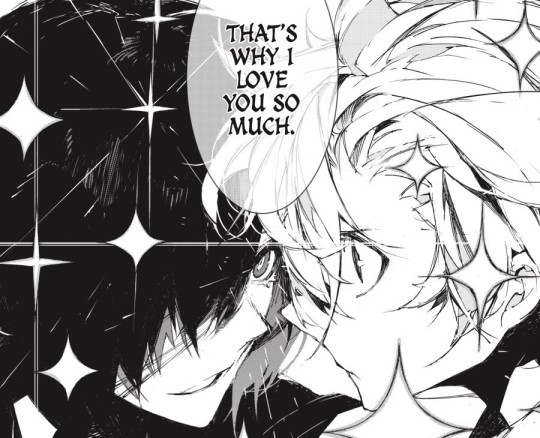
As many of you already know I’m in a crusade against bad translations. I see this panel going around very often but the translation makes me cringe so bad everytime. I'm sure many people are already aware of the mistranslation but I have never seen it explained anywhere so I decided to do it myself.
Disclaimer, English is not my native language.
Let’s start from the previous panel, because ✨context✨ The order is Japanese -- the fan translation I found -- and the official translation.
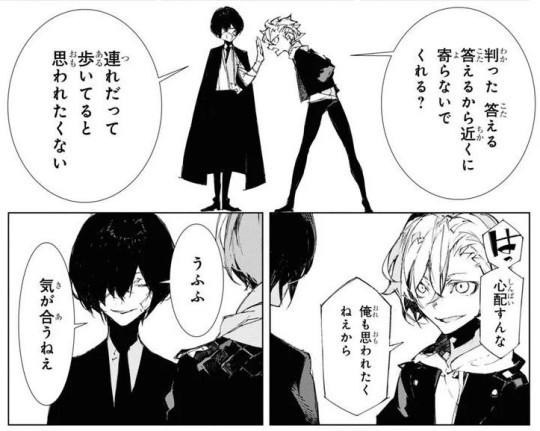
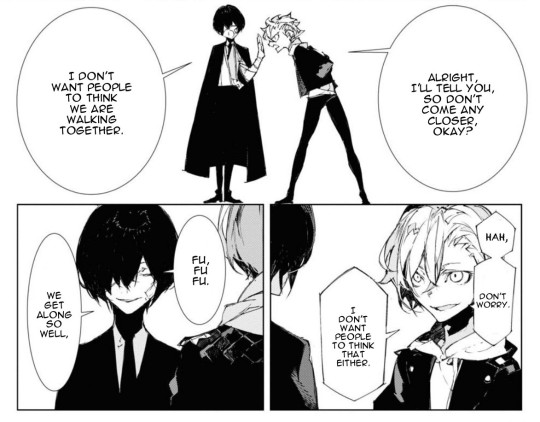
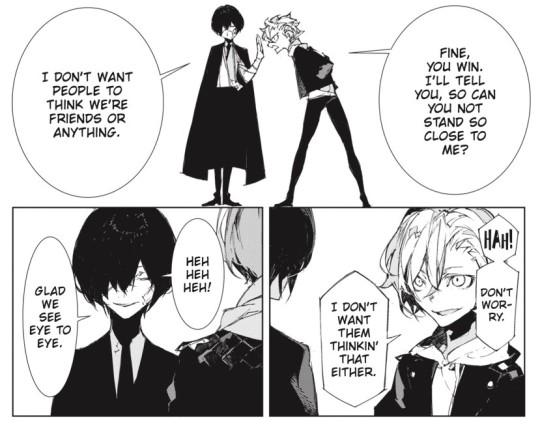
I will write down the literal, weird, almost word for word translation for comparison purposes:
判った 答える 答えるから近くに寄らないでくれる?連れだって歩いてると思われたくない
Understood I’ll answer. I’ll answer so, could you not come any closer? I don’t want it to look like we are walking together (I don’t want it be thought we are walking together)
はっ 心配すんな 俺もおもわれたくねえから
Ha, don’t worry. Because I don’t want it either (I also don’t want it be thought)
うふふ 気が合うねえ
ufufu ki ga au nee
Ok first explanation needed. First, the Japanese definition of ki ga au
気が合う -- 考え方や感じ方が通じ合う (kangaekata ya kanjikata ga tsuujiau)
way of thinking and feeling mutually understood.
"Ki" means mind, spirit, "au" means to meet. The English definition in many dictionaries and google is “to get along” and that’s what the fan translation uses (friendly reminder to ALWAYS use a monolingual dictionary once you reach a level high enough), but the "so well" comes from nowhere. The official translation uses "to see eye to eye". IMO it's more accurate in this context than to get along. But the “glad” also comes from nowhere.
Anyway, now you get the feeling of what it means. I think it's more like Dazai commenting how Chuuya shares with him the same feelings about the situation.
“fufu you agree, I see…”
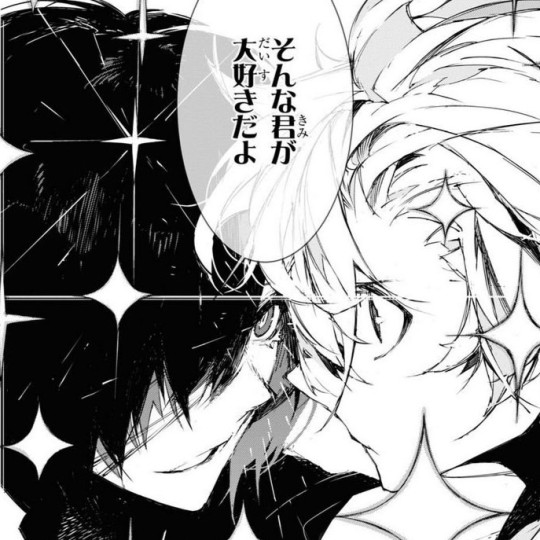
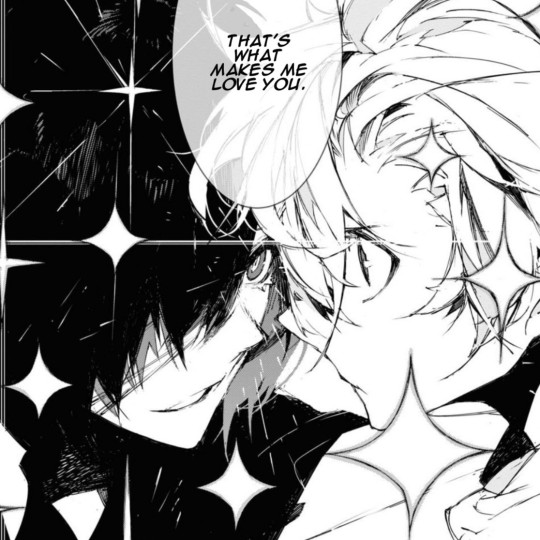
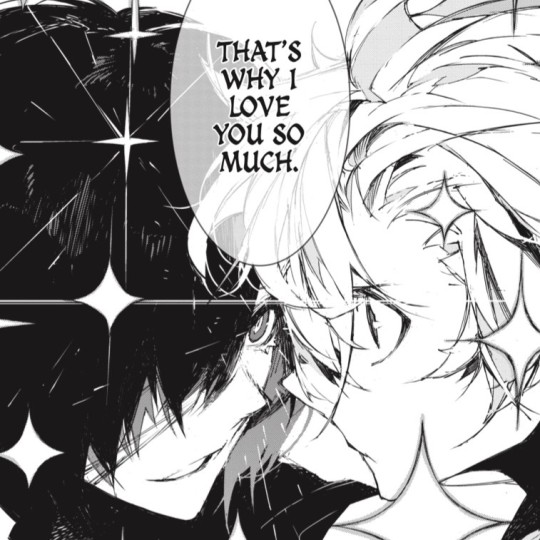
そんな君が大好きだよ
sonna kimi ga daisuki dayo
And we got to the important part.
We have "sonna" that means “such”, “that kind of”. It's a spoken synonym of "sou iu" ("such, like that, that sort of"). As a pre-nominal adjective that goes with kimi, "sonna kimi" it means that you. It has a nuance of surprise when used in sentences like this.
And then "daisukidayo" that of course means I like so much, I love.
What does he loves? "sonna kimi", that is, a specific Chuuya, the Chuuya who is of the same mind that he is about not wanting people to think they were walking together. Or maybe simply the Chuuya that agrees with him, generally speaking.
In both translations the concept is all wrong. It’s presented as if loving Chuuya was the fact and Dazai was explaining the why. But in Japanese, Dazai is singling out the kind of Chuuya he likes/loves if you wish.
Now ask yourselves why specially the official translation chooses to make up the dialogue like that. I'm sure the translators knew enough Japanese to understand it correctly and I don't think it's a matter of cultural adaptation because it never justifies chaging the meaning. The correct answer is fanservice, sales and money 😭
If I had to translate it, I would say “oh I love/like so much that Chuuya!”.
It’s VERY in character for Dazai to say that. And the protest that follows is VERY in character for Chuuya.
うわ……や���ろ!気色悪くて死ぬ!
Uwaa… stop it! It’s so disgusting I am going to die!
僕もだ
Me too.
Yes, Dazai sounds crestfallen.
This is getting too long, so my personal non-grammatical opinions under the cut
I have two, even three theories.
First case, Dazai was honest when he said that.
But he didn't register that's not something you go saying around like that, and he was hit with Chuuya's reaction. Because Chuuya had lived with other kids, so he understood social interactions. But Dazai didn't understand.
I've seen infinite analysis about Dazai and ND, mentall illnesses but not even one analyze this scene. So what if he really loved when Chuuya agreed with him, expressed it without any filters and recoiled when he was met with Chuuya's reaction and realized "that was not a normal thing to do". Remember the scene when he shoots the dead soldier? He seemed to be taking notes of what is and isn't normal. This option breaks my heart.
The criticism would be that what Dazai says doesn't sound so honest. This theory would fit better with the English translations but in Japanese he's very clearly informing Chuuya of the kind of Chuuya he likes, which is a twisted thing to say in any language. So maybe Chuuya's reaction is a response to both the nasty observation and the words chosen.
Second option, Dazai knew what he was doing
He used daisuki to provoke Chuuya, to mess with him and make him angry.
That's something 22!Dazai would do easily but I don't know if 15!Dazai was already so good at it. Anyway in this case the surprise would come from the genuine disgust in Chuuya's reaction instead of the expected anger. Chuuya is Chuuya, and he is immune to Dazai's manipulation schemes, except Dazai didn't know it yet. Also once he said it, daisuki was so cringe (and he was 15 😂). Absolutely in character for both of them.
Third option. Dazai said he wanted to make Chuuya his dog.
Dazai was a very messed up kid at that point. The first thing he thinks when he meets another (very powerful) boy his age is to dominate him and make him obbey his orders as his dog. The way he says that to Chuuya can sound very domineering, oh you agree, that's the Chuuya I love. That's a good boy 🐕. And then he felt down when Chuuya rejected that praise with disgust. In the manga it really looks like this option, with a very close and pushing Dazai and an uncomfortable looking Chuuya. I hate that vibe.
Or... possibly it's a bit of all three because after all, nobody knows what's in Dazai's mind 😌
245 notes
·
View notes
Text
Azula

[ image description: a digital drawing of Azula from Avatar: the Last Airbender in my style. She is a light-skinned woman with gold eyes and black hair, the top part tied in a top knot. She is wearing a red cheongsam dress with a wide skirt, a dark red/brown sash and a matching shawl around her arms. Her upper cheongsam has gold hibiscus embroidery, while her sash has gold phoenix embroidery. Whisps of blue fire are coming from her fingers. She is standing in front of a brown Fire Nation sign ]
prints ✨ commissions
I honestly feel like this Azula might be close to my magnum opus 🔥 influences and inspiration under the cut, but the usual warning that it's nigh impossible to condense thousands of years and miles worth of culture into one post so there is 100% nuance and detail missing. Also, I tried my best with the Chinese, but I honestly don't speak a lick of it so I put my faith in strangers on the internet :/ anyway, enjoy:
A Bit of Background:
The Fire Nation is visually and geographically inspired by volcanic islands such as Iceland, Hawaii and Polynesian islands, while the culture of the Fire Nation is primarily inspired by East, South and Southeast Asia, as well as sun-worshipping cultures (such as the Ancient Egyptians and Mesoamericans). For example:
the Confucian concept of ‘filial piety’ (孝顺 or ‘xiao shun’) is central to the Fire Nation too;
the agni kai is a form of honour duel commonly seen in warrior societies of South Asia, and literally translates as ‘Duel of Fire’ or ‘Fire Quarrel’;
the Fire Nation propaganda justifying the war is reminiscent of the Japanese Empire during the Second World War;
the architecture draws on that of Ancient Egypt, different Chinese dynasties, and historic Southeast Asian kingdoms;
the food typically resembles the Sichuan food, particularly in the spiciness and quantities of meat.
Fire Nation Clothing:
The clothing of the Fire Nation draws from many East and Southeast Asian clothing. For example, the armour the military wears has influences from traditional Thai armour, the shoulder pieces the Royal Family wears come from Burmese court wear, the school uniforms are inspired by traditional Thai clothing, and the Royal Family's top knot appear to come from Qin Dynasty China.
The Royal Court are often seen wearing changshan, a traditional clothing of the Han Chinese, although that is not the only influence. For example, Azula's skirt comes from the wraparound trousers worn in Laos, Cambodia and Thailand, while Ty Lee and Toph's jewellery comes from the Thai mongkut.
My Design:
While Azula (and, in fact, many other Fire Nation characters) originally had a distinctly Japanese-influenced design, I decided to roll with the overarching Chinese aesthetic that she and the Royal Court ended up with. I think it's well-established that Azula's obsession with perfection extends to her appearance, not just her bending, so I decided to draw her as the perfect Fire Nation princess.
My starting point was the Chinese phoenix (鳳凰 or ‘fenghuang’), which symbolises, among other things, feminine beauty and good fortune, and is traditionally associated with the Empress in Imperial China. In addition, the phoenix and the dragon are often seen as representative of the yin and yang, the two complimentary and opposing forces in Chinese philosophy, and I think the two nicely symbolise Azula and Zuko's contentious relationship. I also embellished her dress with hibiscus flowers, as they symbolise glory, grandeur and fame, which I believe Azula desires greatly.
#azula#azula atla#atla azula#atla#avatar the last airbender#avatar the legend of aang#atla cultures#atla culture#fire nation#cheongsam#qipao#hanfu#chinese hanfu#chinese phoenix#phoenix#hibiscus#red and gold#red aesthetic#gold aesthetic#art#digital art#fan art#fantasy art#disabled artist#no ai#small artist#artists on tumblr#art commissions#commissions open#comms open
250 notes
·
View notes
Text
As I deepen my study with Chinese, the more I'm struck by how word meanings work. The monolingual USAdians I know or encounter online, who studied only as much as needed to get through school, really do seem to think languages are plug and play: know the word in both languages, and swap.
But that couldn't be further from the truth. There's on Chinese word, 稳当 (wĕn dang), that's really struck me for that. Because my flashcards give three translations for 稳当: reliable, secure, and stable. And in English these words are all fairly different! Clearly related but very much do not mean the same thing. How can one Chinese word mean these three different concepts? Well, of course, it doesn't. 稳当 means 稳当, some fusion of those three concepts we have words for in English but not quite any of them, that makes it appropriate to use in places where English would use any of those three. There are surely shades of meaning, and which interpretation of the meaning is most appropriate to a given context will be understood upon reading.
Now, expand this understanding - that a word doesn't mean (exact direct swap in English) but rather the word means the word, and we approximate it to the closest English equivalent we can - to *every single word in every single sentence in an entire book.*
Then translate that book.
Translation is an art, not a science, requiring tremendous verisimilitude in *both* languages, and an understanding of the story, and a deep familiarity with the culture (social, historical, linguistic, etc.) of the original work, and often knowledge of the authors intent (if possible to ascertain), and a range of other skills. Translation will always be interpretive and transformative, because (word in one language) doesn't precisely mean (word in another language). They're not "the same." If I present you a sentence with 稳当 in it, does it mean stable, reliable, or secure? Well that depends. On what? How it's being used, the surrounding context, other factors, and of course... the reader or translators interpretation.
It drives me insane when I see people present alternate translations as some kind of "gotcha" that one translator got things wrong. And don't get me wrong - of course some translations ARE just wrong, obviously if I translate 稳当 to mean "goldfish" I'm not interpreting I'm just incorrect. But beyond obvious mistakes, a world of nuance exists, and different translators can in good faith reach different conclusions on the most appropriate translation. This is WHY famous books not in English get translated repeatedly by different people, and why a reader would want to read multiple translations of the same work - to see, in different translations, some shadow of the wonderful nuance embodied by the original words that do not, and cannot, simply be swapped 1 to 1 for a perfect English translation. And this is *especially* true of a language like Chinese, which is ancient and beautiful and deeply steeped in understandings of Chinese history and literature.
Why do you think I and many others are studying Chinese for years? For me, it's all so I can read the actual books myself and get that much closer to the story, that much closer to my own interpretation. I'll never have the skills of a knowledgeable translator - this isn't my profession, it's my hobby - but I'll gleen things nonetheless and it's important to me to try.
Too many of yall disrespect those skills so much that you'll throw a sentence of a language you know nothing about into Google translate and then declare the translator Wrong (and sometimes Bad and Malicious) based on that.
稳当 means 稳当. It doesn't mean "reliable." It doesn't mean "the exact translation of 稳" plus "the exact translation of 当". It's a Chinese word with a Chinese definition that we retrofit English on to.
And the hardest part? Look, I'm still a Chinese novice. For all I fucking know, 稳当 actually MIGHT have three distinct definitions. Everything I said about it above might be wrong. I don't know enough Chinese yet to know for sure, and that's a level of nuance and understanding I'll only reach by reading more.
Multiply that by *every single word in both the original language and the language it's being translated into.*
That's what translation is.
Good luck.
#unforth rambles#translation#chinese langblr#ive been nursing this post for months in my head#nothing specific made me post it today#just my universal low level frustration with english speakers whove never translated anything in their lives#acting like they know literally anything and have an opinion worth listening to about translation#i used to do translation projects decently regularly when i was studying japanese#it is unfathomably hard and if you dont even know enough to recognize that its hard you really truly need to shut the fuck up
304 notes
·
View notes
Text
Furigana & Okurigana
As you progress with your Japanese studies, you will see two very important kinds of Hiragana. They are called furigana and okurigana. In this post let’s take a look at each of them and how they both help Japanese learners and natives read Kanji!
But first, let me introduce a chart for the vocabulary that you’ll see in this post. Each word is written in Kanji and then in Hiragana, with its part of speech and meaning.

1) Furigana
Furigana, also known as よみがな or ruby, are the Hiragana characters either on top or to the side of Kanji characters.

As you can see, if the writing is horizontal, the furigana will be on top and if the writing is vertical, it will be on the right side. Either way, furigana tell you how to pronounce the Kanji characters.
There may be anywhere from 1 to 5 Hiragana characters represented by a single Kanji character!

We Japanese learners need furigana when we start studying Kanji and reading Japanese text. But Japanese children also need furigana when they are learning Kanji and even Katakana. Here you can see furigana used to learn Katakana characters.
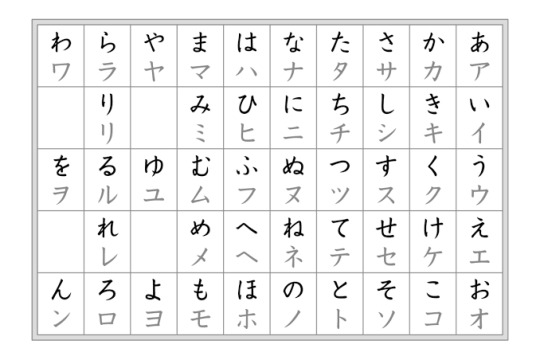
Whether or not you see furigana depends on a few different factors:
the intended readers
the rarity of the Kanji
Generally, you won’t see many examples of furigana. However, if you pick up a book/novel intended for elementary-aged children, you might see lots of furigana. This is because (like us!) they either haven’t learned the Kanji’s readings or the writer intended the Kanji to be read in a certain way.
Some websites, books, IG posts, Youtube videos, etc that are intended for non-Japanese readers will also have a fair amount of furigana. Granted, it is helpful at first, but it’s a good idea to wane yourself off of furigana as you get better (or if you WANT to get better). The more you see a Kanji character, the more likely you are to remember its reading.
Gikun
Sometimes furigana doesn’t actually tell you the reading of the Kanji. Instead it’s used to add details or add shades of nuance, as in the examples below:

In these cases we call the furigana gikun, which loosely translates to “a false reading”.
On the left, the Kanji reads きぼう, which means “desire or wish” but the furigana reads ひかり, which means “light”. This conveys to the reader that light is a metaphor for hope in whatever setting you are seeing that Kanji.
On the right, the Kanji reads ちきゅう, which means “Earth” but the furigana reads ふるさと which means “home town” or “where someone is from”. This tells the reader that someone is an Earthling – as compared to a Martian or an alien from another planet.
This is a more-advanced way that furigana is used, so you won’t see it unless you are reading manga or novels aimed for native speakers.
First the Word, Then the Kanji (Ateji & Jukujikun)
On the day that I arrived in Japan, they asked me for my name in Katakana at the airport. I hadn’t really thought about it so they wrote my name how it sounds to the Japanese ear.
A few days later, I was thinking about this, and it occurred to me that in the same way that they just “assigned me” katakana, I could also give myself Kanji for my name! My name is Albert but I took my nickname Al and “Hiraganized” it, getting ある. At this point I needed 1 or 2 Kanji that sounded out ある. I eventually decided on 亜琉. I’ll come back to this a bit later.
亜琉 is what is called ateji. I started with a word and “worked backwards” to end up with Kanji, based on their readings. Another example of ateji is the Japanese word for The United States. Written with Hiragana it’s あめりか, but written with Kanji it becomes:
亜 read as あ 米 read as め 利 read as り 加 read as か
Keep in mind that these Kanji have nothing to do with the meaning of “America” or “The U.S.” (whatever that is lol). They were only chosen based on the way you read each Kanji. This is the idea of ateji.
A similar concept is Jukujikun. The word あさって means “the day after tomorrow”. When it came time to assign Kanji to this word, the following 3 were chosen:
明 meaning “tomorrow” 後 meaning “after” 日 meaning “day”
You can reasonably see how this combination of Kanji can come to mean “the day after tomorrow”. The thing is, the actual way you read those Kanji are nowhere close to あさって!They were chosen because of their meanings and not their readings. It’s almost the reverse of ateji. 2 more examples are:
今日 is read as きょう but 今 is not きょ and 日 is not う
下手 is read as へた but 下 is not へ and 手 is not た
When it comes to jukujikun, because the furigana can’t be separated between the characters, it will appear either in the middle of the characters or stretched across them.

As for my Kanji, because the characters sound out ある, 亜琉 is ateji. However, I also chose 2 Kanji with meanings that I liked. 亜 means “Asia” and 琉 means “gem” so I chose my name to mean “gem of Asia”.
2) Okurigana
Now, let’s talk about okurigana. It is similar to furigana, except that it only appears next to Kanji. Okurigana is thought of as “hanging off of” Kanji characters.

The okurigana tells you how you should read the 食 Kanji. In this particular example, both words mean “to eat” so mixing them up is not the end of the world (depending on who you are talking with!). Other times, however, the meanings will be drastically different so okurigana is a vital part of Japanese.
Adjectives and Verbs
Most of the time, you’ll find okurigana with adjective and verb forms. This is because they have a core part (called the stem) that will not change, and an ending that changes to add different shades of nuance to the core meaning. Think of the difference between “kick”, “kicks”, and “kicked” in English.

Notice that sometimes the adjective or verb stem doesn’t overlap with the okurigana (Type 1). Other times, part of the stem is included in the okurigana (Type 2). The main thing to remember is, the okurigana is the Hiragana after the Kanji.
Another time you will see okurigana is with compound verbs. This is where two verbs are combined into one. In these cases, there will be okurigana both between and after Kanji characters. Examples are:
思い出す, which means “to remember” 食べ残す, which means “to leave food half-eaten”
Nouns
Most of the time, nouns are made up of only Kanji. However, there are some occasions where they will have okurigana. Most times, they will end in a character from the い VSG.

This is because they actually come from verbs! Here are some examples:
匂い (from 匂う) ���き (from 好く) ーーーーーーーーーー 乗り場 (from 乗る) 立ち飲み (from both 立つ and 飲む)
Other times, they aren’t derived from verbs, they are just simply nouns:
勢い, which means “force, power” 後ろ, which means “behind, rear” 全て, which means “all, everything” 情け, which means “pity, sympathy” 斜め, which means “diagonal, slanted”
Same Kanji, Different Okurigana
The function of okurigana is to point you in the right direction of how to pronounce a given Kanji. There would be no reason for this if each Kanji had only 1 possible reading. As it turns out, a single Kanji can have many different ways to say it. Here are some examples:


As you can see, depending on the okurigana, 汚 can be read as きたな or as よご. On the other hand, the Kanji 広 is read as ひろ in all 5 of those words! For this reason, I would recommend learning Kanji like 広 early in your studies. It will be much easier for you to remember a Kanji with only 1 or 2 readings than a Kanji with many different readings.
Same Kanji, Same Okurigana
It’s rare, but there are times when the okurigana unfortunately won’t tell you decisively how to pronounce the Kanji. Here is an example:

As you can see (with the help of the furigana!) BOTH the Kanji and the okurigana are the same, making them different words but homographs. If it weren’t for the furigana, you might not know which reading of the kanji to use. In this situation, they both mean “to open” but the way and the kind of opening is different. Japanese often separates very similar meanings by using different Kanji. In English, we just take it for granted that you can open your eyes and you can also open a door. In Japanese, they are two different kinds of actions, and so different Kanji are used. (It won’t matter when you speak, but when you write or type, it would be good to be aware of the difference.) In these kinds of cases, you will have to rely on either context or on furigana to know which reading is correct.
Conclusion
As you can see, both furigana and okurigana will help you when it comes to reading Kanji. Sometimes you will have both, other times there will only be okurigana. Later on in the Kanji section, we will take a look at other ways to help you guess a Kanji’s reading. Until then, good luck with your Japanese journey!
And with that, you are finished with the Hiragana section. Congrats!
Rice & Peace,
– 亜琉 (アル)
👋🏾
#learn hiragana#hiragana#japanese language#learn japanese#japanese#study kanji#kanji#learn kanji#japanese studyblr#japanese langblr#learning japanese#japanese kanji#study blr#language blr#日本語���勉強#日本語#日本語勉強#langblr#漢字#isshonihongo
128 notes
·
View notes
Text

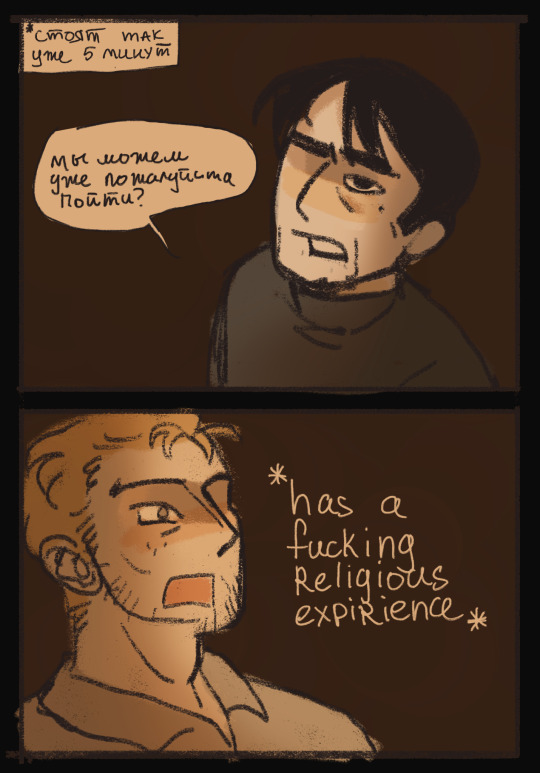
so everyone (me and two other people) have been talking about the whole burda sculptor x painter au and i remembered about this small comic i made a few months ago
translation: [hey, can we go already?]
and a few thoughts about my vision below the cut
so paradoxically i see daniil as a person who does not understand modern art, does not respect it and doesn’t like it. i mean, in his eyes, there are a bunch of tala ted people who just ???do nothing???? with their skills and ideas. it annoys him af, because if ‘all those skills and ideas were applied on practice (i.e something that has a ‘proper utility’. miracles are supposed to work for people’s sake, they must serve us as natural resources do. so, he respects basically any artist who experiment not on the canvas, but right here, before themself. he respects architects, directors and those who try to make impact on a person or challenge their mind through the art that physically exist, those who prepare theoretical part of miracle. well, you can argue with a lot of points here. i can argue. i do not agree with him on how art utility works, there are many contradictions, and i find his approach to the art wrong. (also there are many nuances i can’t care enough to discuss it with myself (or anyone else) in this tumblr post
contrary, artemy, as a person who feels, as a person who’s lead by love and intuition, as a person who knows lines - any art that was made with a concept, with a thought, any art is special to him. he can feel this art, almost can hear what it says or that it’s silent. it speaks with him and he listens. he loves it, he finds it interesting and intriguing. art doesn’t necessarily needs a utility, miracle does not need a human nor does it have to serve humanity.
#art#pathologic#digital art#daniil dankovsky#artemy burakh#burakhovsky#мор утопия#даниил данковский#артемий бурах
136 notes
·
View notes
Note
Hello! I've been getting more and more tips for writing thanks to your post about character flaws in my FYP. I was wondering, do you have any posts about character strengths/virtues? Thanks!
Rin's Character Strengths Masterpost ✨
Hey there, fellow writer! 💖 So glad my character flaws post found its way to you! You've asked about one of my FAVORITE topics to explore - character strengths and virtues! And guess what? I've been meaning to write this companion piece for ages, so THANK YOU for the nudge!
Let's dive DEEP into character strengths that go beyond the basic "brave protagonist" or "loyal sidekick" tropes we see everywhere in fiction. Because memorable characters need memorable strengths!
Why Character Strengths Matter Just As Much As Flaws
We often focus SO much on giving characters interesting flaws (which, yes, super important!), but their strengths are what make readers root for them and fall in love with their journey. Strengths are what make your character SHINE in those pivotal moments! ✨
The key is making these strengths SPECIFIC, NUANCED, and sometimes even PROBLEMATIC. Yes, strengths can cause problems too - that's where the juicy storytelling happens!
Beyond-Basic Character Strengths for Your Characters
1. CONTEXTUAL COURAGE 🔥
Not just "bravery" but courage that manifests in specific contexts:
Social courage (standing up to peer pressure)
Intellectual courage (questioning deeply held beliefs)
Physical courage despite specific fears
Quiet courage (the kind that doesn't look heroic but IS)
Moral courage (doing the right thing when it costs them personally)
Creative courage (risking failure and ridicule for their art/ideas)
2. RADICAL EMPATHY 💭
Not just "understanding others" but:
The ability to understand even villains' motivations
Cross-cultural empathy that bridges different backgrounds
Empathy that extends to those completely unlike themselves
Empathy that causes them to make difficult choices others wouldn't
Empathy that allows them to anticipate others' needs before they're voiced
Empathy for those society has taught them to fear or distrust
3. ADAPTIVE INTELLIGENCE 🧠
Not just "being smart" but:
Pattern recognition in chaotic situations
Intuitive problem-solving under pressure
Cultural adaptability when thrust into unfamiliar environments
Emotional intelligence that helps navigate complex relationships
Street smarts that complement (or replace) formal education
The ability to translate complex concepts for different audiences
4. CREATIVE RESILIENCE 🌱
Not just "bouncing back" but:
Finding unconventional solutions to setbacks
Using humor as a coping mechanism during dark times
Transforming trauma into strength without romanticizing it
Building community resilience, not just personal
Learning from failures rather than being crushed by them
Maintaining hope in seemingly hopeless situations
5. PRINCIPLED FLEXIBILITY 🌊
Not just "having values" but:
Knowing which principles to bend and which to hold firm
Adapting moral frameworks to new information
Navigating ethical gray areas without losing their core
Growing their values through experience rather than rigidity
Finding compromise without betraying essential beliefs
Recognizing when rules must be broken for a greater good
6. DISRUPTIVE KINDNESS ❤️
Not just "being nice" but:
Kindness that challenges systems of oppression
Unexpected kindness that changes enemies' perspectives
Kindness as a radical choice in brutal environments
Kindness that requires genuine sacrifice
Kindness that sees beyond surface behaviors to underlying needs
Kindness that doesn't expect recognition or reciprocation
7. CONSTRUCTIVE SKEPTICISM 🔍
Not just "questioning things" but:
The ability to discern truth from manipulation
Healthy doubt of authority without cynicism
Critical thinking that leads to solutions, not just criticism
Questioning their own assumptions first
Seeking multiple perspectives before forming judgments
Recognizing patterns of deception or misinformation
8. STRATEGIC VULNERABILITY 💧
Not just "being open" but:
Knowing when vulnerability creates connection
Sharing weaknesses to build trust at critical moments
Using personal stories to help others feel less alone
Admitting mistakes to model growth for others
Asking for help when independence would be destructive
Showing emotion strategically to influence outcomes
The Strength Spectrum: Make It Complex!
Remember that any strength exists on a spectrum! The most interesting characters have strengths that sometimes function as weaknesses depending on the context.
For example:
Loyalty becomes enabling when taken too far
Curiosity becomes recklessness in dangerous situations
Honesty becomes cruelty without empathy
Ambition becomes destructive when ethics are compromised
Compassion becomes self-destruction without boundaries
Independence becomes isolation when connection is needed
Confidence becomes arrogance without self-reflection
Cautiousness becomes paralysis when action is required
Strengths in Character Arcs 📈
The MAGIC happens when you show how strengths evolve throughout your story:
The Dormant Strength - A character doesn't know they possess it until circumstances force it out
The Misused Strength - They have the strength but are applying it in harmful ways
The Costly Strength - Using this strength requires genuine sacrifice
The Transformative Strength - This strength fundamentally changes who they are
The Shared Strength - They teach/inspire this strength in others
The Rediscovered Strength - A strength they lost faith in that returns when most needed
The Evolving Strength - A strength that changes form as the character grows
The Collaborative Strength - A strength that only emerges when combined with another character's abilities
Writing Exercise for You! 📝
Take your protagonist and identify:
One strength they've always had and rely on
One strength they don't know they have yet
One strength that's actually causing problems
One strength they'll need to develop to overcome the main conflict
One strength they admire in someone else
One strength they've lost and need to reclaim
Genre-Crossing Character Strengths
These strengths work across ALL genres:
Perceptive Pattern Recognition - Seeing connections others miss
Adaptive Authenticity - Remaining true to themselves while evolving
Constructive Conflict Navigation - Using disagreement to build stronger relationships
Radical Responsibility - Owning their part in problems without self-flagellation
Generative Listening - Hearing beyond words to underlying meanings
Intentional Impact Awareness - Understanding how their actions affect others
Courageous Vulnerability - Risking rejection for authentic connection
Principled Pragmatism - Finding workable solutions that honor core values
Remember that in ANY genre, your character strengths should connect to their internal journey as much as their external conflicts. The most compelling characters have strengths that are tested, lost, rediscovered, transformed, and ultimately deepened through their story arc. 🌟
The most powerful character strengths aren't superpowers or extraordinary abilities - they're deeply human qualities taken to their most compelling expression. They're the things we recognize in ourselves but rarely develop fully. That's why they resonate so deeply with readers across all genres and age categories.
Hope this helps you craft characters with rich, nuanced strengths! Let me know if you want me to dive deeper into any of these - I could talk character development ALL DAY! 💖
~ Rin. T.
#writers block#how to write#thewriteadviceforwriters#writeblr#writers and poets#writers on tumblr#novel writing#fiction writing#romance writing#writing advice#writing blog#writing characters#writing community#writing help#writing ideas#writing inspiration#writing guide#writing prompts#writing a book#writing resources#writing reference#writing tips and tricks#writers#writing tools#writing life#writing software#writing#creative writing#writing tips#on writing
111 notes
·
View notes
Text
I don’t know if anyone’s thought of this, but something that’s always intrigued me about A Court of Thorns and Roses is the way faeries age—and how deeply underexplored that concept is in terms of actual behavior. In Prythian, we’re told multiple times that faeries live for centuries, sometimes thousands of years, and yet, when it comes to their emotional, social, and psychological development, the series often maps mortal expectations onto them—especially regarding maturity. And that raises a lot of questions.
In human society, we have a clear (albeit socially constructed) marker for adulthood—18. In most countries, that’s the legal threshold where you’re considered mature enough to vote, join the military, sign contracts, or be held accountable under the law. But let’s be real: biologically and developmentally, most 18-year-olds are still maturing. The brain doesn’t finish developing until the mid-20s, and emotional regulation, impulse control, and long-term planning all sharpen much later. Even historically, this line was blurry. In medieval and early modern Europe, for example, girls were often married at 12 or 14, and boys were deemed men as soon as they could wield a sword or work a field. These standards weren’t based on actual maturity, but on survival, labor, and social structure. Meanwhile, in Ancient Rome or Greece, concepts of adulthood varied dramatically across gender, class, and region. What’s “adult” has never been as fixed as we like to pretend.
So how does that translate to fae?
We’re told in ACOTAR that faeries age incredibly slowly. A fae in their eighties or nineties might still be considered a child. But what does that mean in practice? What does a “childhood” that stretches over a century look like?
And more importantly—why don’t we ever see it?
The series tends to write younger fae (like the priestesses, or various High Fae we meet) with the emotional maturity of seasoned adults. Even Feyre, once she becomes fae, is immediately treated as psychologically equal to people like Rhysand, who’s literally over 500 years old. Yet logically, if an 80-year-old fae is the equivalent of, say, a 12-year-old human, then someone in their 50s or 60s should be acting like a moody tween. Immature, impulsive, maybe precocious, yes—but still fundamentally not an adult. Still learning about identity, morality, boundaries. And that opens the door for some deeply rich storytelling that just isn’t there.
I would have loved to see fae in their 50s and 60s behaving like children. Not just in an “innocent and wide-eyed” way, but in all the messy, intense, emotionally volatile ways children are. Think of a 60-year-old fae noble throwing a tantrum in court because someone slighted them. Imagine how layered a dynamic it would be if Nesta or Feyre met a fae who looked thirty but acted like a six-year-old—playful, emotional, deeply curious, easily hurt.
It’s not just about making the world feel more real—it’s about the consequences of immortality. If you live for a thousand years, then why wouldn’t a century-long adolescence exist? And how does that warp power structures, especially when you consider people like Rhysand or Cassian potentially having lovers who, in human years, are still literal children?
This kind of worldbuilding matters. It forces us to examine the ethics of power, of emotional development, of autonomy. It also invites more nuanced conversations around trauma, healing, and time. A mortal girl suffering trauma at twenty might be expected to “move on” within a few years. But for a fae, what does that look like when five years is barely a blink? Are young fae punished for childish mistakes because they “should know better,” or are they protected under fae law until their first century is complete?
Ultimately, I wish the series had leaned into this more. There’s so much potential for complexity, for culture, for age-based customs that aren’t mapped onto human standards. The real tragedy isn’t that the fae are inhuman—it’s that, too often, the narrative forgets to let them act like it.
#anti acosf#anti inner circle#anti acotar#anti rhysand#anti feysand#anti cassian#anti azriel#anti amren#pro nesta#anti morrigan#anti nessian#anti night court
73 notes
·
View notes
Note
I'm sorry to bother you if this question has been asked already but I noticed something.
I was playing the EN version of TWST and in book 1 when Riddle is hit in the face with an egg, Trey says a rather long response, but the EN version only has him saying "an egg...?!" And I noticed in the EN translation of the manga and the novel that there's the same thing, where Trey only says "egg". But what is he actually saying? QQ please help.
Hello hello! Thank you for this question! 🥚
This is a great catch!
Trey's original dialogue is 「!?なんだ...卵?寮生が投げた......のか?」
This is close to, "!? What...an egg? Thrown by......a dorm member?"

Trey's shock is not from just anyone throwing an egg at Riddle, but from the fact it is a member of Heartslabyul: one of the students of their own dorm, turning on their Housewarden.
This point is more heavily emphasized in the novel, with Trey protecting Riddle from additional eggs and yelling at the rebelling students, "This is your housewarden!"

Trey's bewilderment at the concept of a member of Riddle's own dorm betraying him was removed from EN, possibly due to the awkwardness of putting the word 寮生 (member/student of the same dorm?) into English? It was maybe easier for the EN team to remove it, leaving us without that nuance and just "an egg" :>
Thank you again for this question! This EN change has been added to twstnote ^^
114 notes
·
View notes
Text
Snape and the Autistic Mirror:
One interview from Rowling has always stood out to me. When asked why Snape didn’t walk away from his Death Eater peers to keep Lily’s friendship, she answered:
“He never really understood Lily’s aversion; he was so blinded by his attraction to the dark side he thought she would find him impressive.”
Let’s pause there. He didn’t just ignore or dismiss her feelings—he genuinely didn’t get them. That’s not just tragedy. That’s a potential flag.
And something about that hits differently when viewed through a neurodivergent lens. Let me be clear: this is a fictional character. No one here is diagnosing book characters for real. Real-world diagnoses belong to real professionals. But fiction allows us to explore patterns. Fiction gives us mirrors.
There’s a difference between being emotionally stunted and being emotionally wired differently. Between apathy and misattunement. Snape loved deeply—maybe too deeply. But he also misread people, misjudged situations, obsessed over ideas, clung to rules, and lived in a world of black and white. He held grudges like anchors, craved structure, fixated intensely, kept to himself, and was constantly misunderstood. And maybe—just maybe—that wasn’t only trauma. Maybe it was neurodivergence, too.
That disconnect Rowling describes—the way he couldn’t comprehend Lily’s moral boundaries despite loving her fiercely—highlights something fundamental: difficulty recognizing the emotional logic of others. It’s not about lack of caring. It’s about a different kind of cognition. One where emotional nuance, unspoken expectations, and moral intuition don’t always translate.
Clinically, these traits can overlap with autistic profiles—not as stereotypes, but as patterns—like difficulty with cognitive empathy (understanding how others feel, even when you deeply care), struggling to interpret social and moral signals, or intense fixation on concepts like justice, loyalty, and control.
And when Rowling says he thought becoming a real Death Eater would impress Lily… that doesn’t sound like arrogance. It sounds like a devastating misunderstanding. Like someone trying to speak a language no one ever taught him. What if he couldn’t read the room—not out of malice, but because his brain just didn’t work that way?
What we may be seeing isn’t a character meant to explicitly “represent autism,” but someone Rowling wrote with a kind of intuitive accuracy that resonates with autistic readers—and with anyone familiar with the social, emotional, and cognitive experience of neurodivergence. Maybe that’s why so many autistic readers see something of themselves in him. Not because he’s perfect. But because he’s lost in ways that feel familiar. Because he misreads the signs, overcompensates, hurts and gets hurt, over and over, and still tries.
Sometimes, being misunderstood isn’t just part of your story. It is your story.
#pro snape#snape fandom#anti snaters#snapedom#severus snape#snape meta#pro severus snape#autism#harry potter fandom#harry potter#snape defender#snily#lily evans#character analysis
104 notes
·
View notes
Text
good books of 2024
according to meeee.
there is no order here, at least one of these was published ages ago, I'm just working my way through my 2024 timeline, godspeed spiderman. 🫡
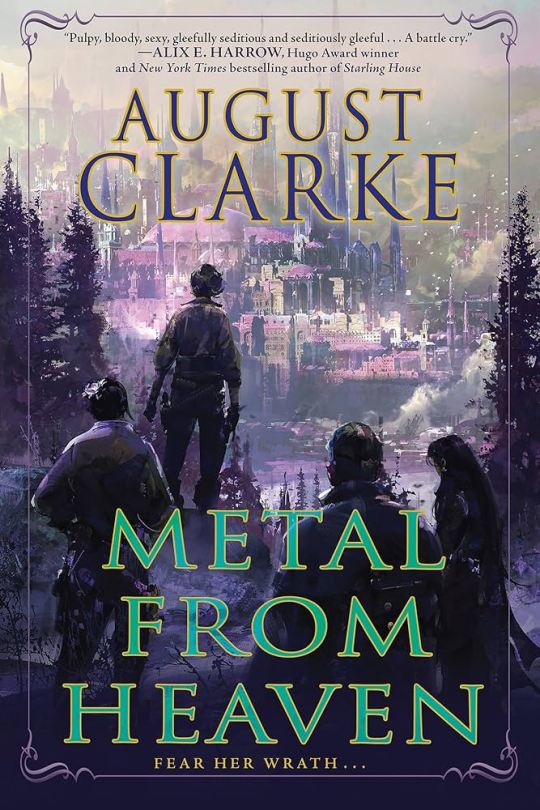
Metal from Heaven
surprise hit of 2024. top of the charts. stunning, spectacular. gorgeous. Metal from Heaven FUCKS. almost every single main character is an explicit spicy toxic hot mess of a lesbian committing literal highway/train robbery, the bad guy is literally named Industry, leading to such peak sentences as "I am going to kill Industry." the prose is synesthetic in a way that most writers cannot sustain for a full novel but which here culminates in a moment of pure blissful Neon Genesis Evangelion that I will not elaborate on due to spoilers. the author pulls out the FUNNIEST lines, and also the most abrupt and heartbreaking tragedies. we're not here to be subtle, we're here to put the pedal to the metal until the engine explodes. such a damning, whip smart condemnation of industry, capitalism, power. all in the form of Lesbians. also the phrase 'clown orgy' is mentioned. this shit is like gideon the ninth with CRUNCH. NSFW.
but don't take my word for it. take amal el-mohtar's.
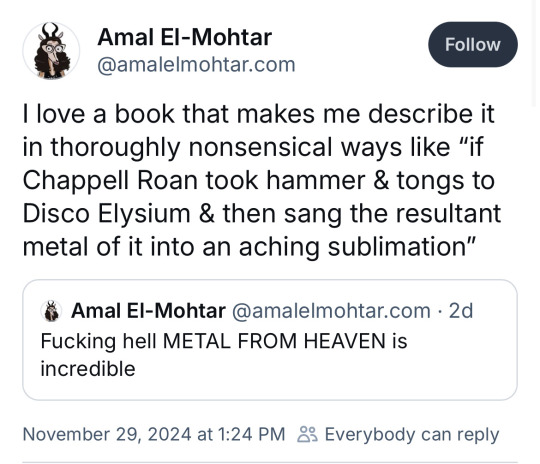
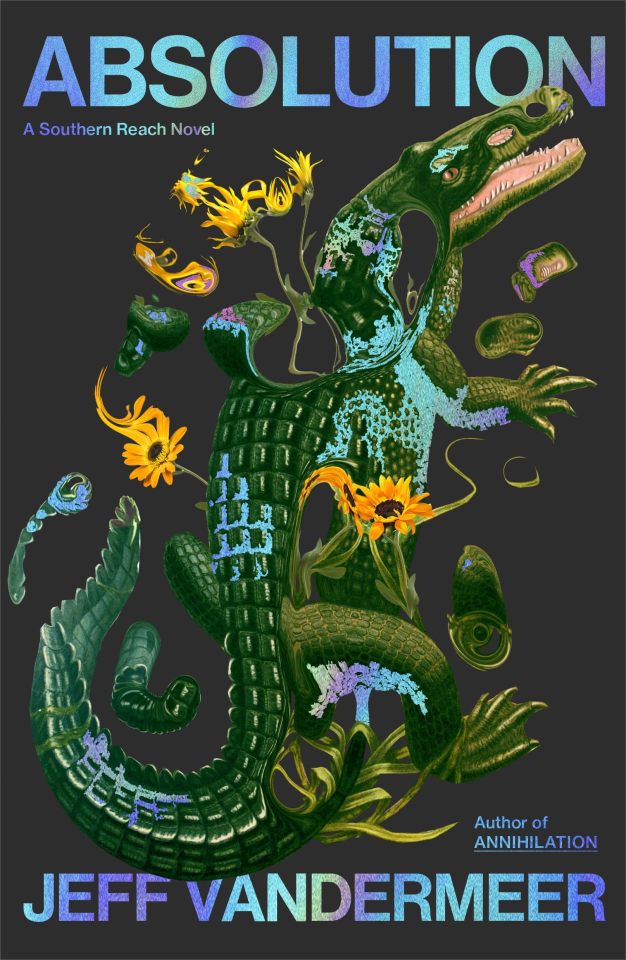
Absolution
Absolution is a hard book. requires thought and rigor at all times to absorb what's going on - and also a reread of the entire trilogy beforehand, because there's time travel nuance involved, which makes it next to impossible to sum up the plot coherently on its own without spoiling things. jeff vandermeer described it partially as 'fuck that alligator from the movie' and - valid. the first 60% had me; the later section...swapped gears drastically, which meant it took a while to hit its stride (aka until it reached Area X again). in hindsight I was just not prepared for one of the POVs to be the Freudian, violently stoned, unreliable narrator love-child of Karkat and Dave Strider whose perception/conception of the heart of the Southern Reach is extremely phallic. and then suddenly cannibalism happens. I liked Annihilation and Acceptance better, but damn. it almost feels like this should be the set up to another trilogy. much 2 think about.
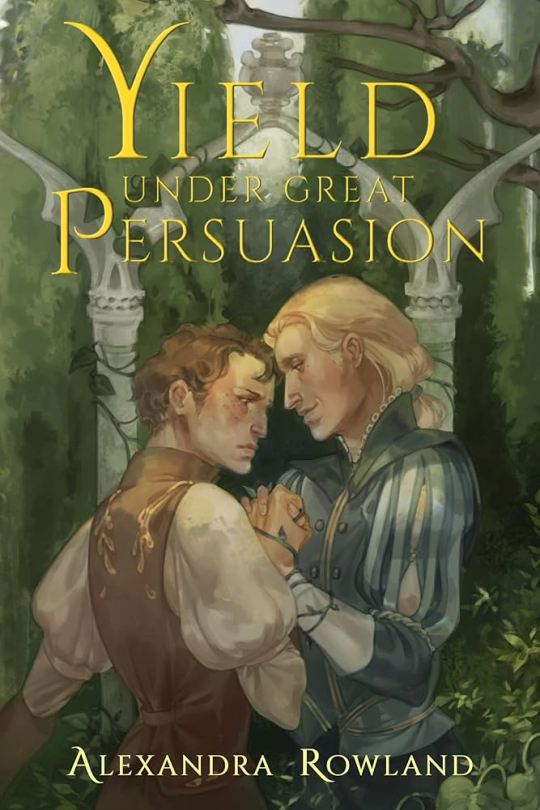
Yield Under Great Persuasion
I don't know why I didn't hear anything about this one before it came out! (instead, I only saw posts about rowland's other book released this year, running close to the wind - which sadly did not hit for me at all). Yield Under Great Persuasion is just ridiculous enough to be fantastic. stubborn little gremlin man, big mad about Pumpkingate years after the original inciting incident that set him at odds with his love interest, attempts to pack his little rucksack and run away from all his self-inflicted gay problems, fails, is forced to deal with said personal problems by direct goddess-intervention. you know it's gonna be good when the guys are hate-banging by page 2. a short, delightful mix of (extremely silly and low-stakes) enemies to lovers and hurt/comfort and working out your emotional and communication issues on page style comfort food. self-indulgent in a fanfic way that is rowland's trademark in a taste of gold and iron (which was also fantastic and probably deserves a reread now.) NSFW.

The Spellshop
between this and yield under great persuasion there's an odd cozy fantasy pairing here. a self-isolated shut-in spellbook librarian who lives for her work escapes the fall of her city and sets up shop back in her old hometown on a severely magic-deprived island. there's some internalized trauma being worked through, against a simply charming backdrop of community and solidarity and magic spells. really. I was. charmed. which is a rare reaction on my part.
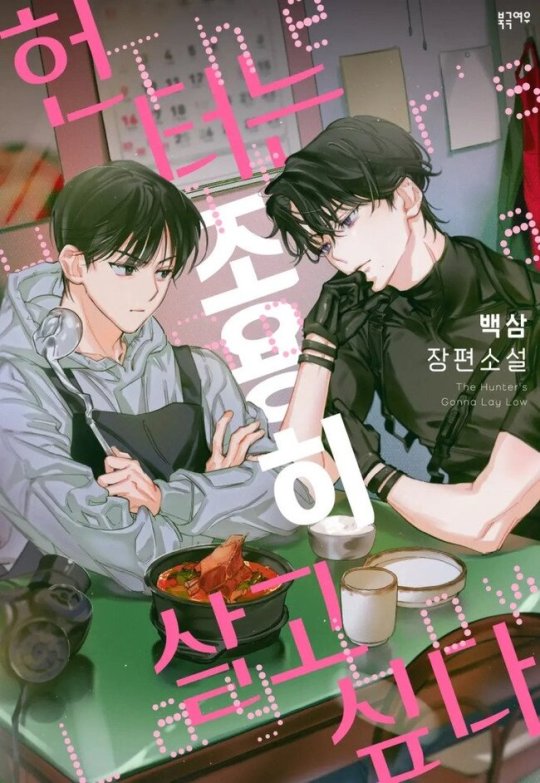
The Hunter's Gonna Lay Low
the curveball of the list, The Hunter's Gonna Lay Low is a translated (gay) Korean web novel, and it's the perfect intersection of a decent translator meeting an author who knows what they're doing. notorious tumblr user @spockandawe has a write up of the plot and its major themes here, but in essence it hooked me with its hunter/super-hero meets Pacific Rim setting, its themes of gifted kid burnout and unacknowledged trauma with the weight of the world on his shoulders, and the fact that the author clearly plotted out all of this in advance, with minor details from the opening chapter being extremely plot relevant a hundred chapters later. also, the characters are FUN! the relationship compels me. clownery abounds in all the best ways, while the world-ending stakes are also scarily sky high. its translation is currently incomplete as far as I'm aware, which is literally this story's only downside right now, since you can read it online for free - but so much of the main story is up and translated already that it's hard to imagine how much higher the stakes can go, and I'm dying to know if these two make it through and get the happy ending they deserve. a delicious repast.
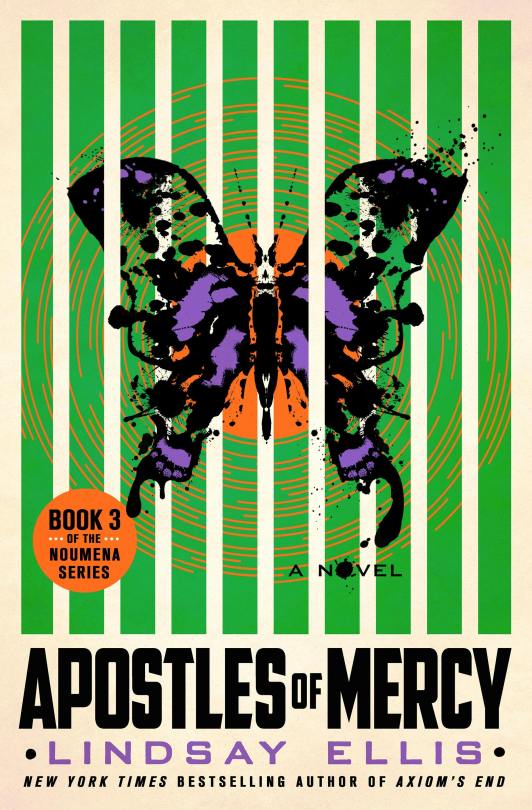
Apostles of Mercy
I'm gonna rant here. this is the story of a series that got the redemption arc it deserved.
if you don't know, axiom's end is lindsay ellis's blatant Bayverse Transformers female lead alternate history fic. period. she has openly admitted this. you can easily and clearly pick out the Optimus/Megatron/Starscream expies. and that first book was GOOD. it understood the assignment. loved it.
then...truth of the divine happened. book two of the series. was frankly. god awful. it was like twilight's new moon, where the main character's depression saturates and therefore stagnates the entire narrative, in this case to its detriment. it dragged. the entire appeal of first book of the series is the bond between the main character and her new definitely-not-a-Transformer life partner, and book two managed to both sideline that - the entire point!!! the main thing you're reading it for! the alien time! - and introduce the most skeevy and (for me) unpleasant to read human hetero romance of all time. it was so unpleasant I actually forgot how bad it was.
somehow. somehow. palpatine returned. after I spent three years mourning what could have been. book three saved it. Apostles of Mercy addresses the whole damn skeevy toxic mess that was book two and refocuses on what matters - the alien love interest and a LESBIAN love interest. yes. it's true. once again the sapphics won. we now have a book where the main character is reliving lesbian sex memories as an alien-robot-insect-definitely-not-a-Transformer mindmelds with her so I mean. good job team? her love interest also acquires an alien life partner of her own to expand this into potential alien foursome range? the assignment is once again UNDERSTOOD. in terms of the action scenes, to quote myself while reading it, "I can't believe I'm saying this but you needed to channel far more Bayverse" [for book 2], and doing so for book 3 has produced a work of art. I would say skip book 2 entirely and thank me later, but experiencing how bad the series got at its darkest point is part of what made book 3 such an exhilarating high in comparison. possibly that was the goal all along, impossible to appreciate until now. I just need lindsay ellis to get the contract to write the currently-in-publication-limbo books 4 and 5. because the series deserves it. it only just got good again! NSFWish because I can't remember currently how explicit they got all these months later, forgive me.
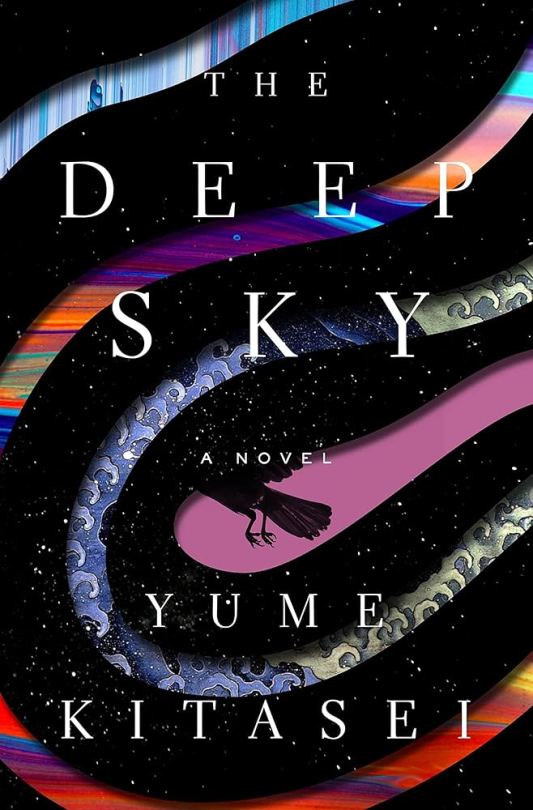
The Deep Sky
yume kitasei is new to me, but this book hit some interesting notes as a sci fi debut. it too is about gifted kid burnout and imposter syndrome, funnily enough, in a thoughtful take on the standard sci fi concept of 'a bunch of rigorously trained young adults are sent out into deep space as an ark to save a dying humanity' that actually does discuss how fucked up that is as a concept, both for the kids as they grow up under enormous pressure to win a spot on the mission and for all those people being left behind, in what might just end up being an overhyped waste of resources, since civilization sure is still kicking when they leave. the summary on the book is somewhat misleading - asuka, the main character, doesn't fall under suspicion until wayyyy late in the book, and spends the majority of it in a pseudo-detective role that is absolutely sanctioned by those in charge. she's not 'an immediate suspect' like the book blurb insists. go figure. it didn't knock me out of the park like most of the books above, but it was an engaging little read.
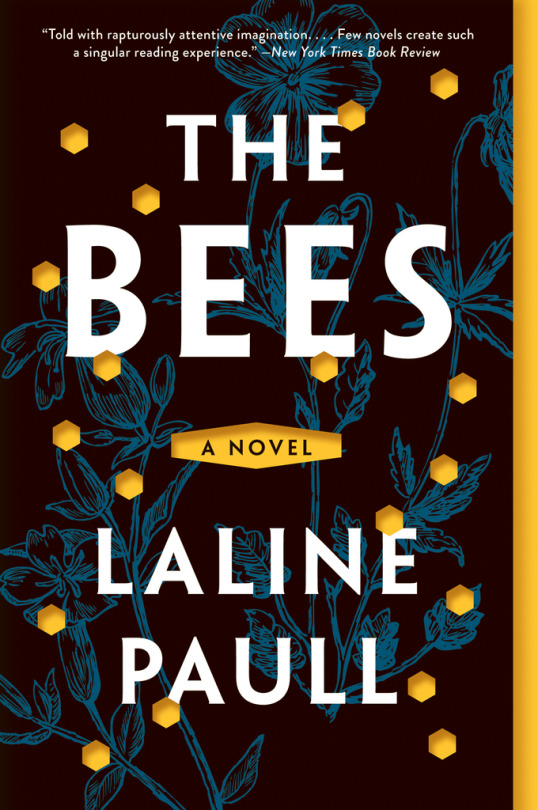
The Bees

a weird one from 2014, picked up on a whim - it's literally about bees! fictionalized bees! with personalities and priesthoods and caste politics and everything! I cried about it to be honest. very plotty, somehow all of it neatly taking place within the Lifecycle of A Bee™️, which takes some real craftsmanship to pull off and make compelling as a narrative. since I'm an unrepentant Raksura fan, I was like 'wow...how Raksura coded...' knowing full well that Raksura are dragon bee people, not the other way around. also the Raksura could never be as toxic (complimentary) as these bees are. 😂 it's just good literature your honor.
honorable mentions:

Heavenly Tyrant
has not come out yet. but let's be real. it's on the list in anticipation. it's what she deserves.
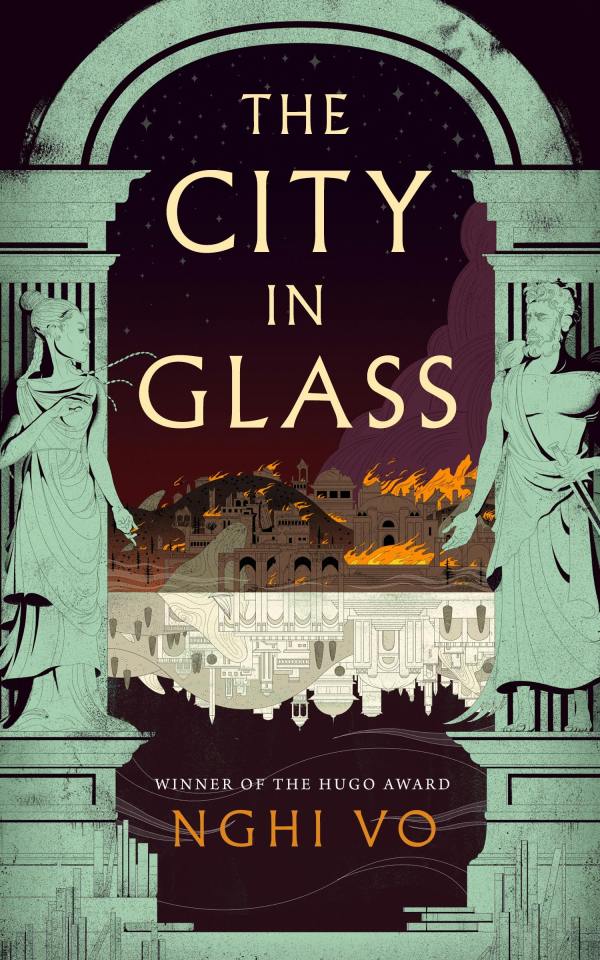
The City in Glass
I love nghi vo's work, have read and adored all of the singing hills cycle novellas. it took a month for my library hold on this book to be available. and then I promptly got distracted by metal from heaven and the hunter's gonna lay low 😂 I will read it!!! the first eight pages were good! vitrine's voice is very good! I've just had a very busy end of the year interrupting my everything. (update: I read two more pages and it immediately and promptly popped off. whoops. guess I'm reading that next. whenever I have free time again...)
#book recommendations#the hunter's gonna lay low truly gives off madoka vibes at times (complimentary)#i need more people to buy apostles of mercy in the dim hope it will continue lmao#long post
158 notes
·
View notes